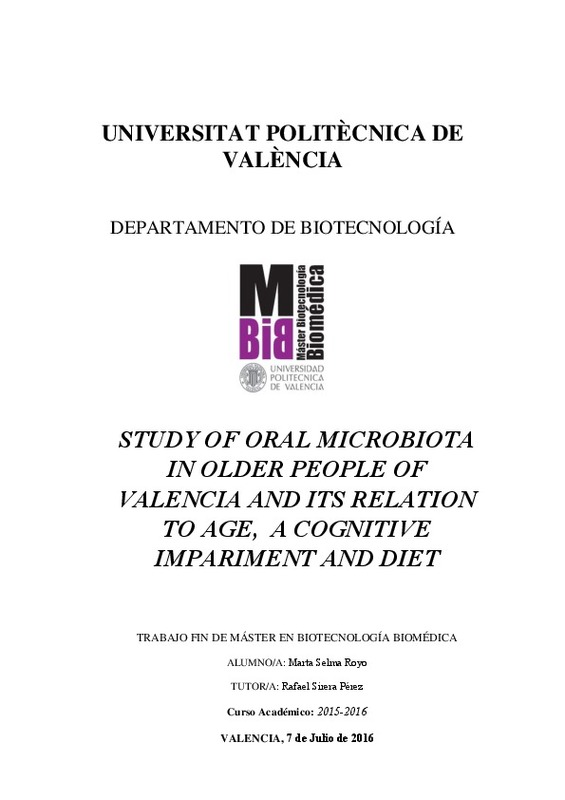JavaScript is disabled for your browser. Some features of this site may not work without it.
Buscar en RiuNet
Listar
Mi cuenta
Estadísticas
Ayuda RiuNet
Admin. UPV
Estudio de la microbiota oral en personas de la tercera edad de la Comunidad Valenciana y su relación con edad, deficiencia cognitiva y dieta
Mostrar el registro sencillo del ítem
Ficheros en el ítem
| dc.contributor.advisor | Sirera Pérez, Rafael
|
es_ES |
| dc.contributor.advisor | Collado Amores, María Carmen
|
es_ES |
| dc.contributor.advisor | Perez Martinez, Gaspar
|
es_ES |
| dc.contributor.author | Selma Royo, Marta
|
es_ES |
| dc.date.accessioned | 2016-11-17T10:55:57Z | |
| dc.date.available | 2016-11-17T10:55:57Z | |
| dc.date.created | 2016-07-15 | |
| dc.date.issued | 2016-11-17 | es_ES |
| dc.identifier.uri | http://hdl.handle.net/10251/74273 | |
| dc.description.abstract | [EN] The increase in life expectancy in the last century is one of the great achievements of medicine. But it is generating health, economic and social problems, among which is the alarming increase in cognitive problems and dementia in elderly . Cognitive impairment has been linked to inflamma tory processes, and these would be the common point of many of the diseases associated with aging , such as Alzheimer . Recent studies rev ealed the influence that could have the gut and oral microbiota in the general health, and more specifi cally in the inflammatory and cognitive status in the context of immune senescence. T he relationship between the composition of the oral microbiota, inf lammatory markers and cognitive impairment in people over 65 years with varying degrees of cognitive level will be determined. It has been analyzed saliva samples from volunteers over 65 years of age (n = 34) in order to determine microbiome profiles usin g molecular techniques such as quantitative PCR directed to bacteria, fungi and yeast, Denaturating G radient G el E lectrophoresis - DGGE and high throught - put sequencing of 16S bacterial gene. Cognitive test data were collected and inflammatory ma rkers in b lood samples analyzed as C - reactive protein (CRP), myeloperoxidase (MPO), apolipoprotein E (APOE) and cortisol levels in saliva samples. We have identified the associations between oral microbiome composition with the cognitive impairment degree and the body mass index in order to establish relationships between health and healthy aging. Results showed that specific bacterial groups have been linked in previous studies with periodontal diseases, such as Prevotella and Selenomonas genus , which have been also associated with lower cognitive index and higher levels of inflammatory mediators in plasma. This would support the hypothesis of the role of inflammation in neurodegenerative diseases associated with aging and the possible key role of microbiota in t hese diseases. | es_ES |
| dc.description.abstract | [ES] El incremento de la esperanza de vida en el último siglo constituye uno de los grandes logros de la medicina. Pero ello está generando problemas sanitarios, económicos y sociales hasta ahora desconocidos, entre los que se encuentra el alarmante aumento de problemas cognitivos y demencia en personas mayores. La deficiencia cognitiva se ha relacionado con procesos inflamatorios, y estos se perfilarían como el punto común de muchas de las enfermedades asociadas al envejecimiento, como el Alzheimer. En estudios recientes se ha puesto de manifiesto la influencia que podría tener la microbiota intestinal y bucal en el estado de salud general, y más concretamente en el estado inflamatorio y el nivel cognitivo en el contexto de inmunosenescencia. Se determinará la relación entre la composición de la microbiota bucal, marcadores de tipo inflamatorio y la deficiencia cognitiva en personas mayores de 65 años con distintos grados de nivel cognitivo. Se han analizado muestras de saliva de voluntarios de más de 65 años de edad (n=34) con el fin de determinar los perfiles de microbioma mediante técnicas moleculares como: PCR cuantitativa dirigida a bacterias, hongos y levadura, Electroforesis en gel gradiente desnaturalizante-DGGE y secuenciación masiva del gen 16S bacteriano. Se recogieron datos de test cognitivos, test de adherencia dieta mediterránea, así como se analizarán marcadores inflamatorios en muestras de sangre. Estudiaremos las asociaciones entre la composición del mcirobioma con el grado de deficiencia cognitiva, adhesión a dieta mediterránea, así como con la edad de los voluntarios, con el fin de establecer relaciones entre la salud y el envejecimiento saludable. | es_ES |
| dc.language | Español | es_ES |
| dc.publisher | Universitat Politècnica de València | es_ES |
| dc.rights | Reconocimiento (by) | es_ES |
| dc.subject | Microbiota bucal | es_ES |
| dc.subject | Envejecimiento | es_ES |
| dc.subject | Estado cognitivo | es_ES |
| dc.subject | Microbiome | es_ES |
| dc.subject | Aging | es_ES |
| dc.subject | Cognitive impairment | es_ES |
| dc.subject.classification | MICROBIOLOGIA | es_ES |
| dc.subject.other | Máster Universitario en Biotecnología Biomédica-Màster Universitari en Biotecnologia Biomèdica | es_ES |
| dc.title | Estudio de la microbiota oral en personas de la tercera edad de la Comunidad Valenciana y su relación con edad, deficiencia cognitiva y dieta | es_ES |
| dc.type | Tesis de máster | es_ES |
| dc.rights.accessRights | Abierto | es_ES |
| dc.contributor.affiliation | Universitat Politècnica de València. Departamento de Biotecnología - Departament de Biotecnologia | es_ES |
| dc.description.bibliographicCitation | Selma Royo, M. (2016). Estudio de la microbiota oral en personas de la tercera edad de la Comunidad Valenciana y su relación con edad, deficiencia cognitiva y dieta. http://hdl.handle.net/10251/74273 | es_ES |
| dc.description.accrualMethod | TFGM | es_ES |
| dc.relation.pasarela | TFGM\50600 | es_ES |






